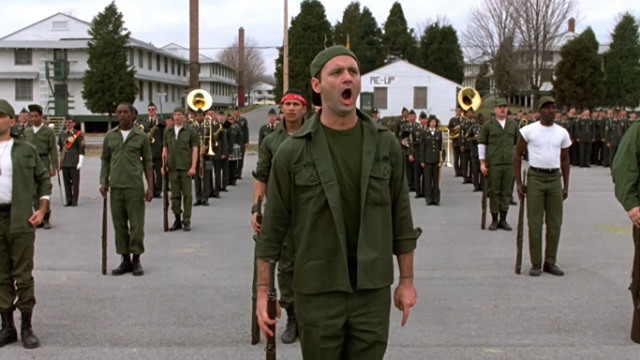The reason I wanted to watch and write about this film was because for the last few years, I’ve been puzzling over, for lack of a better phrase, white guy anti-authoritarianism. Stripes feels to me like a specific expression of not particularly well-thought out stick-it-to-the-man bullshit, all the moreso because as far as 80’s comedies go, it’s average at best. The timing is weak, the plot is slow and plodding, the characters are barely broad sketches, and most of all, there’s not really anything spectacularly funny – it feels like a dry run for the comedies I actually like. This is most obvious in the way it establishes part of Bill Murray’s comic persona; his middle-aged shift into sad sack hasbeens really wasn’t that surprising considering how they started out as slackers who never really fit into the world that well. The basic story of Stripes is a slacker breaking into a stuffy, claustrophobic world, burning it down, and triumphantly rebuilding it in his own image. The best part of the movie is the spectacular marching sequence (if this movie has any value to me personally, it’s that it captures the feeling of of my dad’s army stories), showing that the hero and his friends can be perfectly disciplined if they put their minds to it, but only to things that really matter to them.
Which is what makes this all interesting to me as part of the conversation on anti-authoritarianism. I think it would be fair to describe the current popular wave of feminism and leftism as authoritarian, in personality if not in policy, and a lot of it feels like a response to the exact kind of guys Bill Murray as John Winger represents. Now, I actually still have a lot of affection for Bill Murray’s movie persona, even if the guy himself is an asshole and his movies weren’t all hits. I’m attracted to the fundamental idea of recognising the pointlessness to a lot of social rituals and etiquette, seeing them for the empty rituals they are; Stripes does some good scenes in which Murray effortlessly punctures situations that aren’t nearly as serious as they’re treated.
But I also recognise how many people have latched onto anti-authoritarianism, if not as a way to exercise power over others, then as a rejection of any kind of wider responsibility, and don’t apply the kind of nuance to tell the difference between a serious situation and a non-serious one; to put it less dryly, people who listened to Zach de la Rocha rap “Fuck you I won’t do what you tell me” and applied to people trying to teach them long division. Which leads me to the fact that by ‘people’, I largely mean ‘men’. Stripes gives us some fairly straightforward representation of the ugly side of male anti-authoritarianism in the way the women in the film are treated; an extended scene in which John manhandles and bullies a woman as a way of flirting with her, and there are many sequences simply leering at naked women with only the barest (sorry) joke at the expense of the men who do it.
It makes that arc of rebuilding at the end something more interesting, if not laudable. It was never about destroying unjust power, it was about being the guy in charge without having to change too much. From a political standpoint, my anti-authoritarian views are based on protecting individual happiness without it infringing on the happiness of others; that an individual’s right to self-determine ends at the other individual’s right to self-determine, and an eye towards destroying power wielded to hurt people for no real damn reason. From a comedic standpoint, my sense of humour is based solely on the destruction of things that have zero consequence. Ego, empty tradition, words for the sake of words.

